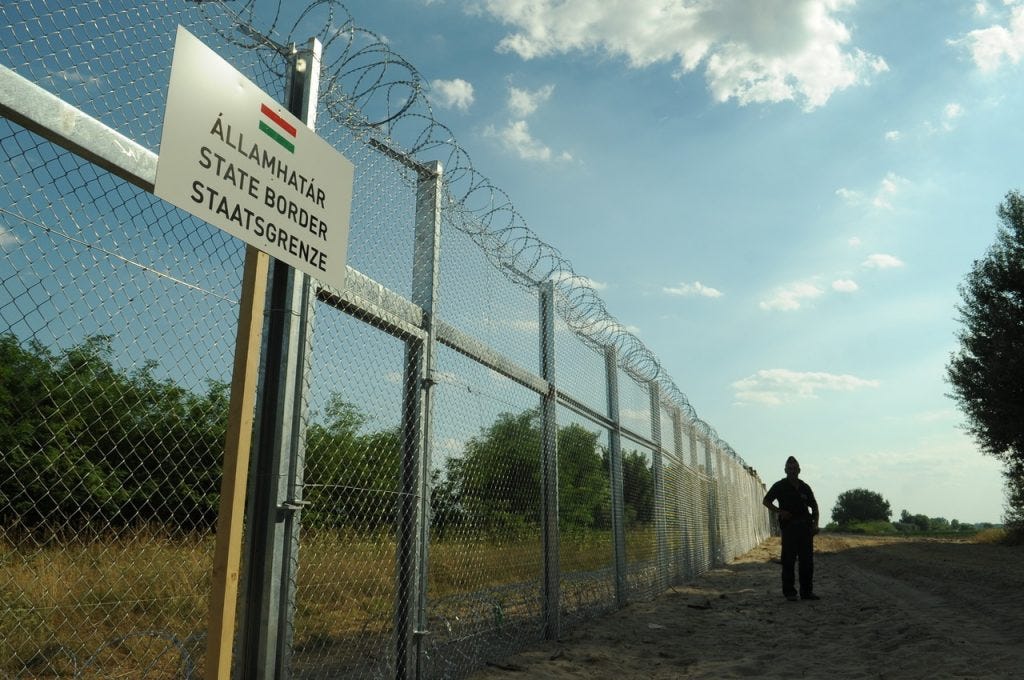Immigration: the philosophical case

To put it bluntly: there is no libertarian philosophical case for open borders. To put it in a different way, libertarians must choose between property rights and open borders. We cannot have it both ways.
The idealized case
Let’s suppose an ideal world where there are no ideological, cultural, religious or philosophical differences between people. Let’s imagine the libertarian garden of Eden, the Neverland of eternal freedom. Every piece of land in it is owned, acquired with the strictest observation of the Non-Aggression-Principle.
Let’s suppose you want to enter my property. Should I have the right to refuse you entry? If I would not, I wouldn’t really have a property, would I? Let’s suppose that I hook up with a hundred other people and their families and build a community. We create a ‘constitution’ to formalize the rules within this community. Shouldn’t we have the right to create such rules? Couldn’t those rules include provisions to accept or exclude new members to the community? Couldn’t we demand that anybody who wishes to be part of this community must abide by its rules? Thousands of such neighborhood associations exist in the USA. Let’s suppose that our experiment is so successful that thousands join in, all accepting the rules previously set. As the community grows we figure out a way to delegate some decision making to some of our representatives. We all agree that we will abide by the rules these delegates make on our behalf ……. or let’s suppose that we work out a perfect way to have direct democracy and every decision we make reflects truthfully the will of every single ‘shareholder’ of our commonly owned property. Can we then still decide at that point to refuse entry to some who wish to come?
Would the size of the community change anything in this model? Would the method of delegating authority? As long as private or incorporated property owners have true property rights, the treatment of the borders of their property is entirely at their discretion. Denying them the right to control their property is denying them the right to fully own that property.
In its idealized form, the democratic state is the representative of the will of its citizens. In its idealized form, the democratic state is the owner of any land that is not directly owned by one of its citizens.
A country, in an idealized form is nothing more and nothing less than the ‘collective’ property of its citizens, its fate decided through whatever form of decision making system those citizens set up. Every new citizen whether born or naturalized is getting a ‘share’ of the collective property which is the nation state. The right to enter this collective property should be regulated through collective decision making. How a decision is made or how the decision making is delegated is irrelevant to the essence of the question. No matter what angle we are looking at it from, the idea of open borders is in direct conflict with the idea of private property.
The pragmatic case
Now let’s consider the other side of the question. Let’s suppose that I want to invite you into my house. Should anybody be allowed to stop you from entering? I hope not. But I don’t own my house alone. An indivisible half belongs to my wife. Shouldn’t she have the right to veto my decision?
Let’s suppose that our hundred family community needs some workers to mow our lawns or to teach our children. Should any outside agent be allowed to interfere with the decision who we hire and from where? Again, I hope not. But could any previously made ‘inside ‘agreement prevent it? What if it is part of our community constitution that we do not allow loud motorcycles into our community? That would exclude any teachers coming on choppers.
Should we be allowed to put restrictions on ‘consensual’ relationship? Should I, for example, be allowed to say that “you are welcome in my house except one room, and tomorrow morning you will have to leave”? Any hotel owner does just that. Or to say that “You have a two year contract to work for our community after which you will be asked to leave”? As long as our agreement is consensual, even far more complex sets of conditions should be allowed as a matter of fact.
I hope it is not difficult to see how these arguments can scale up to the size and complexity of an existing nation state.
We could, of course, question the decisions made by our elected representatives or the executors of their decisions. We can even question the appropriateness of the system of representation or the scope of the decision making power delegated, but not the idea of collective decision making.
On a philosophical level, libertarians have to make a choice: it is either property rights or open borders. We cannot have both.
This is an unusually short post, because the point it makes is so obvious. How is it possible that so many libertarians cannot see it?
=======================
This post is part of a series on immigration, you can find the rest here:
Immigration delusions Immigration – My personal stories Immigration – race, culture & ideology Immigration – the philosophical case (this post) Immigration – the cultural case Immigration – the moral case Immigration – the economic case Immigration – the political case Immigration – Libertarian kumbaya



